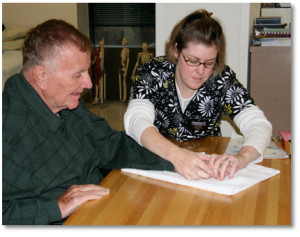The Role of Occupational Therapy in Achieving Healthy Sleep Patterns
Occupational therapists have for a long time acknowledged the impact of sleep on occupational performance. That is in fact why the American Occupational Therapy Association includes rest and adequate sleep as an area of occupation addressed by advanced occupational therapy. That doesn’t and shouldn’t come as a surprise, given that at the moment, there are at least 80 recognized sleep disorders, each disorder leading to various negative results such as:
- Poor performance at work
- Stress
- Depression
All these are problems or rather challenges that occupational therapy assistant and practitioners uniquely address. Note that occupational therapists work with patients following medical diagnosis so as to create behavioral changes that facilitate active daytime participation as well as performance.
Role of OT
Occupational therapists use knowledge of sleep disorders, sleep physiology and evidence based sleep promotion techniques to evaluate and address functional impact and ramifications of sleep disorders and insufficiency. Therapists develop individual sleep routines that help patients to demarcate day and night. They also train and help patients to use recommended equipment such as the sleep apnea mouth guard. Effective therapy which includes work out programs facilitates arousal and fosters socialization. This reduced involuntary napping during the day and improves sleep maintenance as well as latency. Bedding management, pajama preferences and sleep hygiene may also be used in occupational therapy to achieve desired results.
Assessment
Therapists evaluate patients in areas that contribute to sleep disorders. They study such things as sleep latency, which is basically the period one takes to completely fall asleep. A good occupational therapist will ask you if you have ever taken a sleep test before. The therapist will then take a look at the test results as well as your doctor’s assessments. Note that the whole therapy treatment process is always not easy for patients. It is therefore recommended that you approach your therapy programs with an open mind. You also need to note that several things can trigger bouts of sleep apnea episodes. This could happen because:
- You try to compensate for sleep loss
- You don’t adhere to stimulus control instructions
Most patients have issues keeping up with sleep hygiene and adhering to stimulus control instructions. Sleep hygiene has everything to do with maintaining regular sleep and wake up patterns. Sleep stimulus on the other hand is a behavioral treatment for sleep disorders designed to overcome conditions that come with several repeated and unsuccessful attempts to fall asleep. Remember that apart from therapy, such things as eye masks and blackout curtains may enhance the quality of your sleep.
Choosing the Right Therapist
Your doctor should help you choose the right occupational therapist. Not because that is part of his or her responsibility to you, but because they can always point out good therapists more than other people. It is important that you choose a therapist who employs evidence based and proven occupational therapy programs. This is the only way you can be sure that by the end of your therapy, you sleeping habits will have improved for the better.
More tips
Restful and adequate hours of sleep provide the foundation for peak occupational performance, engagement in daily activities and socializing. This is the concept that is consistent and directly linked with development of modern day therapy. All occupational therapy schools use the concept as the basis of their therapy training. Keep in mind that even effective occupational therapy techniques can be hindered by one’s unhealthy habits. That is why therapists often advice patients to be patient with the whole therapy program and sacrifice habits that frustrate achievement of healthy sleeping patterns. Such habits include excess alcohol consumption, overuse of sedatives, chain smoking, overworking one’s self and over reliance on sleeping pills.



